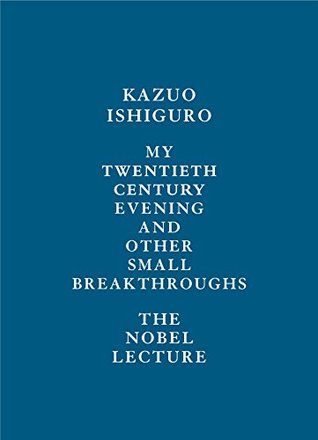
My Twentieth Century Evening an Other Small Breakthroughs, The Nobel Lecture
Summary
Review
This compact collector’s book is not one of Ishiguro’s works for which he was awarded The Nobel Prize for Literature. It’s his story. How a kid grows up amid his influences of family and place. Considered by many to be the most gifted writer of our generation he speaks to future generations of writers. To respect the craft and to keep the craft alive. To say what you must, to explore what you need, to create what needs to be created. To keep the flame burning inside of you, knowing what’s important. Not just for writers but for all of us.
What I loved about this speech/book is how without any of several key intervening events in his early writing days, he never would have been a writer, let alone one of the Greats. Foundational events subtle as a feather tickling his nose became formational and flipped his real writer’s switch on triggering a confluence of events in his mind that needed a home.
His fish out of water beginnings nibbled at his consciousness like leaving Japan at five and never returning though every year he was told the next year they would go back “home”. His mind began remembering and formulating his own unique version of “Japan” in his mind, hanging on to it as the years passed. Yet he hadn’t given it any thought as he wrote what was expected among his British peers growing up in England and never leaving. His ethnicity provided one foot mentally in one country, the other foot physically in another. After writing a few pieces and getting accepted to a University fellowship, suddenly he changed tacks. His brain wanted to write about the “Japan” that resided in a corner of his brain preparing him for what life would be like when he returned even thought that world, that “Japan” no longer existed.
It wasn’t normal nor expected, but he suddenly to write what he needed to write, not what his training and society said to write that he was bored with. He noticed past works weren’t similar in topic but found a certain similarity and repetition in them and forced himself to make a break from a formula. After his sudden change and interest in Japan he wrote several more novels about it and then turned that spigot off to write about the U.K.. He wrote the hyper English novel, “The Remains of the Day” a huge novel and made into an even larger movie. The first of a string of extraordinary novels.
I think most people that enjoy reading, including myself are fascinated by why writer’s write. Was it just that they liked to write? Partly. It’s because that they must write. When catalysts fire off around most writers they are compelled to write and frequently never stop because they have a stories that must be told. In my case, my first book was a complete reaction to psyche overload to compensate for a traumatizing event and I needed to find answers. And as I researched the illusive mysterious root cause for the uprooting event, I had to ask myself after a long search, “What is really important in life? There’s more to life than finding a medical answer. I had to stay motivated and as important as finding answers. Part memoir, part inspirational, part activating enrichment, as well as learning about others’ great courage of survivors inspirational stories. I felt it was important to write for others that walk alone searching and to give them a path forward without having to reinvent the wheel, and hear about others that have walked the same path you have and how they made it.
Ishiguro’s lecture shows how one’s path becomes clear only when unburdened with following the “expected” path, and not your own. It reveals itself when least expected by being on the lookout for it by looking within, listening to your intuition. Your unconsciousness will work on it for you once the seed is planted and will provide a spark of insight, a path forward immediately, in a month, a year, or sometime down the road by following what’s important to you. It’s never too late or never too early. Just because it’s hard doesn’t mean you give up by ignoring it. It’s self-defeating and demoralizing when the easy path is taken leaving the real you with hopes and dreams behind.
Review Author Zane Pace
Author of new releases When Stars Align, Destiny Happens and LunaLani the Starlifter, Secrets of Magic Island.
Rating
Plot
Characters
Interesting
Review Summary
User Rating:
Be the first one !

